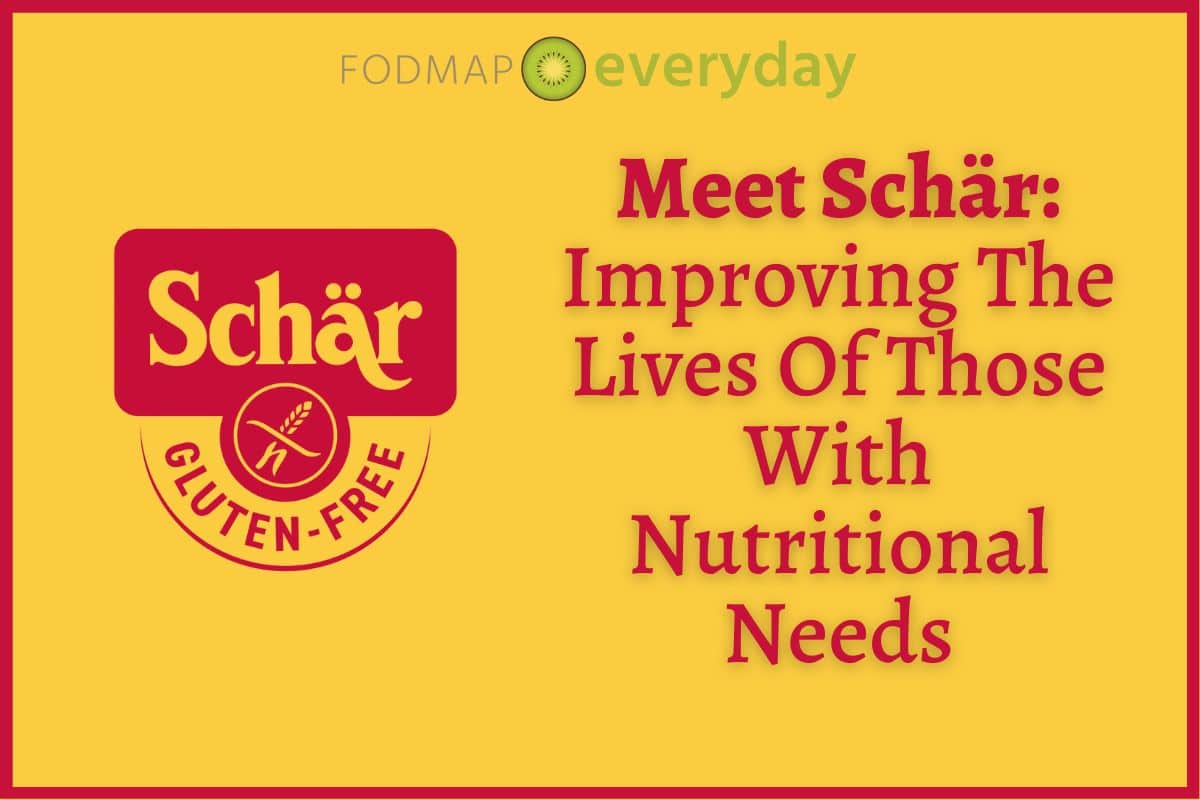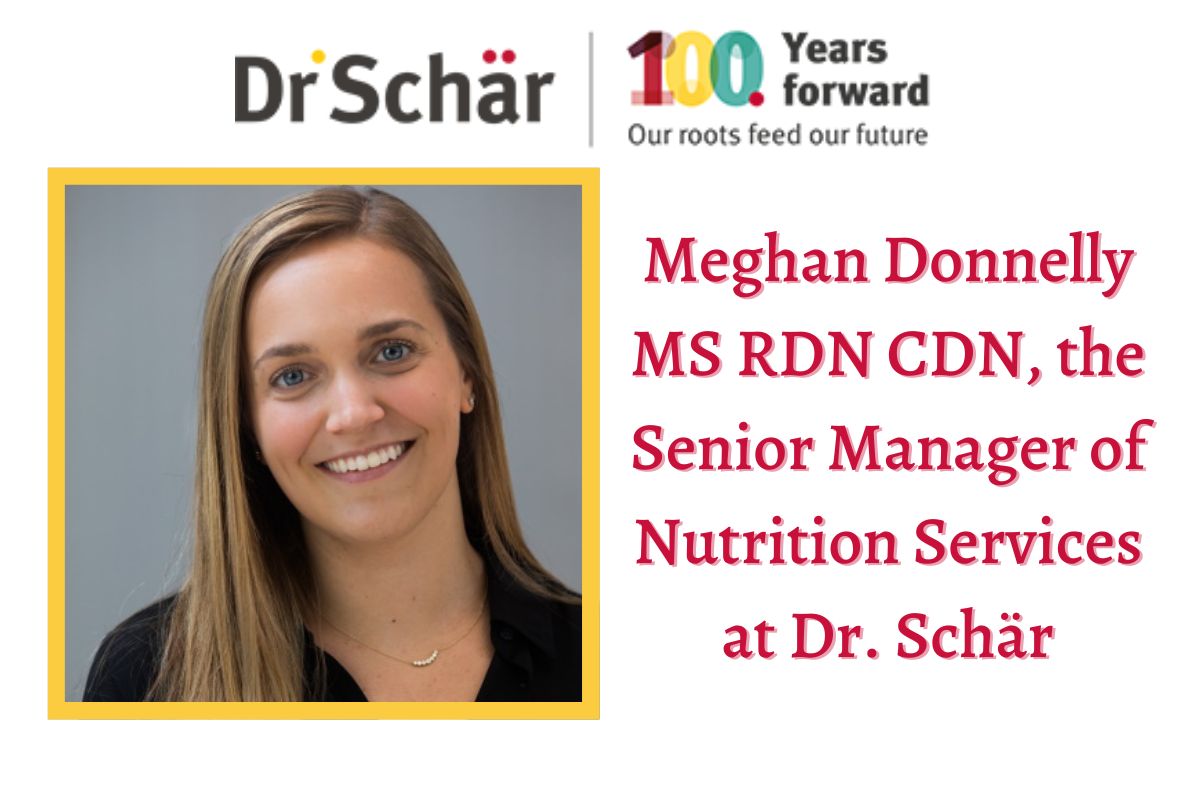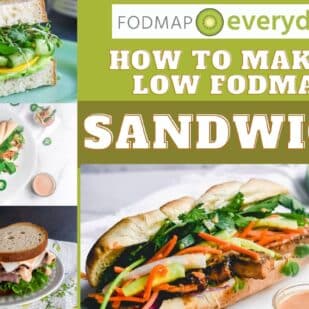The low FODMAP diet can be a godsend to those of us with IBS. It can bring relief where there was none before, and we can experience a full life and positive relationship with food – free from IBS triggers.

But it can be complicated; getting to that place of relief is made much easier when we have lab tested and certified low FODMAP products to rely on. Everyday foods, like bread, are a must-have. And some of our favorite low FODMAP gluten-free bread comes from Schär.
Schär is much more than just bread, but it is one of their core products, from sliced bread to baguettes, rolls, ciabatta, pizza crusts – all lab tested and certified low FODMAP – and many other offerings.
We want to introduce you to this long-standing brand and show you how they can fit into your low FODMAP lifestyle – deliciously.
Schär, A Family-Run Company With Global Reach
The Schär brand was born in 1922 in South Tyrol, in the heart of the Alps. Under the direction of Dr. Anton Schär the idea was to improve the lives of those with special nutritional needs. Being in touch with the consumer has always been their guiding commitment.
They have 18 locations around the world that include production facilities and offices in Italy, Spain, Turkey, Germany, France, Brazil, Argentina, Austria, Russia, the UK and the USA and their products are available in more than 100 countries. Perhaps you have seen their red and yellow logo/packaging in your local supermarket?

Schär has a motto: “We believe in the power of food to bring people together, not set them apart”. This is exactly what we believe at FODMAP Everyday®, where we focus on what we can eat, and to create a dietary approach where we never have to feel deprived. Let’s dive into our chat with Meghan Donnelly MS RDN CDN, the Senior Manager of Nutrition Services at Dr. Schär.
Dédé Wilson: Meghan, thank you for taking this time with us. First, tell us about your position with the company and what you do.
Meghan Donnelly: I am a registered dietitian and the Senior Manager of Nutrition Services for the US office. I am responsible for improving education and awareness in our core therapeutic areas: celiac disease, gluten intolerance, and irritable bowel syndrome (IBS). I handle all nutrition-related communications and educational activities, and am part of an international team of dietitians who work together on joint research, quality improvement projects, and healthcare provider relations.
The more I read about the Schär company, the more impressed and intrigued I am, and the origin story is so interesting. Tell us how the company became established, and then also about when the company decided to focus on gluten-free.
2022 is a very exciting year for us because it marks 100 years of Dr. Schär. Our company was founded by a medical doctor, Dr. Anton Schär, in 1922. Though his focus was not on gluten-free food at the time, Dr. Schär realized that there was a huge need to develop special food products for children who struggled with digestive problems and were having trouble meeting their needs from a nutritional perspective.
These products were plant-based and contained easily digestible carbohydrates (e.g. rice, tapioca). Fast forward to 1981 when our current owner, Mr. Ulrich Ladurner, had the idea to create a food brand that was health-oriented, natural, and produced in an environmentally sustainable manner. He took Dr. Schär’s product range, which included many gluten-free products, and started developing a completely gluten-free product range specifically geared to individuals with gluten intolerances.
So really, we have been working to better the lives of those who require a gluten-free diet long before it became a “trend”. From field to fork, our team of experts select the best ingredients from farmers who grow grains especially for Schär. We produce our food in dedicated gluten-free facilities all over the world and adhere to strict quality protocols to ensure that our food is safe for those who need to follow specialized diets, like the gluten-free diet or the low FODMAP diet.
While the low FODMAP diet is not a gluten-free diet, there certainly is a lot of overlap, hence that question. In fact, Schär has over a dozen products that are lab tested and certified low FODMAP by Monash University (available in the U.S.), and they happen to be gluten-free as well. Can you talk a little bit about how these products were chosen for certification – and if there are any more certified products coming soon?
Schär is a dedicated gluten-free company, so everything we make is certified gluten-free. Because the gluten containing grains (wheat, barley, and rye) are also on the high FODMAPs list for fructans, we started working with Monash University in Australia to see if any of our products met the low FODMAP criteria. We started with our breads, rolls, and crackers because the ingredients they contain and the widespread availability in the US. We are always working with Monash to certify additional products in North America and Europe. Hopefully we will have more products certified soon!
The following Schär products have official Monash University low FODMAP certification:
- Artisan Baker White
- Artisan Baker Multigrain
- Artisan Baker 10 Grains & Seeds
- Deli Style Sourdough Bread
- Deli Style Seeded Bread
- Ciabatta
- Multigrain Ciabatta
- Baguette
- Sandwich Rolls
- Hamburger Buns
- Hotdog Rolls
- Pizza Crust
- Breadsticks
- Crispbread
- Table Crackers
- Rosemary Table Crackers
- Multigrain Table Crackers
- Entertainment Crackers
- Ladyfingers
- Breadcrumbs
- Penne
- Fusilli
- Spaghetti
As I mentioned before, I know that staying in touch with your consumer base has always been very important. How did Schär initially become aware of the low FODMAP diet?
This project started back in 2019 as we realized that there is so much overlap between celiac disease, non-celiac wheat sensitivity, and IBS, as well as similar symptoms. The low FODMAP diet has really gained recognition in the past few years, particularly among dietitians who work in digestive health.
Oh yes, I am so glad you said this. Time and again – every day – we are explaining why working with a dietitian is important. As you know, not only is it recommended by Monash University that one undertakes the diet with the aid of a dietitian, but it is the dietitians who are on the frontlines of how best to incorporate the diet into one’s individual lifestyle.
What kind of response have you had from customers on your low FODMAP offerings?
There has been an overwhelmingly positive response! As you know, following a low FODMAP diet can be overwhelming and time consuming, particularly if you are new to the diet. We are happy to offer certified products because this makes the whole process much easier and takes the guesswork out of reading food labels to find appropriate products.
What are their major challenges with following the diet, and how does Schär help?
I think the most challenging aspect the low FODMAP diet is feeling like you lack options and do not know what to eat. This is one of the reasons that certifying products, as we do at Schär, is so helpful for those who need to follow this diet. We also have some educational handouts, articles, cookbooks, and recipes on our website to help you navigate a healthy and well-balanced low FODMAP diet.
Can you clarify for us how to use the various Schär websites, as there are a few? Where should the FODMAPer focus their attention?
Sure!
- Schar.com is our consumer website where we have educational articles, recipes, and information about our products.
- Shop.schar.com is our online store, where you can purchase products directly from us. There is also a low FODMAP filter so that you can easily find our low FODMAP offerings.
- The Dr. Schär Institute is our healthcare provider education platform. Here we have webinars, downloadable patient handouts, and research articles with information on celiac disease, non-celiac wheat sensitivity, and IBS. This website is for healthcare professionals who are seeking continuing education.
- Drschar.com is our corporate website that provides an overview of the global company, talks about our history, and introduces our other brands that are available in Europe.
Circling back to your company’s focus on gluten-free products, folks should be aware that you have many resources for those with celiac disease, gluten sensitivities, as well as wheat allergies. We hear questions all the time about what distinguishes these from one another. Can you talk about this a bit, especially the wheat allergies? It is always so interesting to see where the low FODMAP diet overlaps, and where it doesn’t – but where symptoms can.
Though many of the symptoms are similar, it is important to understand the difference between celiac disease, which is an autoimmune condition, food intolerances, and food allergies.
In people with celiac disease, consumption of gluten triggers an immune response which causes internal damage to the small intestine and subsequently prevents absorption of important nutrients. Symptoms can vary, but often include digestive problems, skin rashes, fatigue, nutrient deficiencies, or poor growth. There is a clear diagnostic protocol for celiac disease, and in general, your doctor should test you for celiac disease before recommending any dietary changes if you have symptoms.
Yes! Everyone reading this should hopefully have not self-diagnosed IBS, and will have been screened for celiac before starting the low FODMAP diet.
Food allergies, like wheat allergy, occur when your immune system identifies a protein in food as an invader, and reacts by producing antibodies to fight it. Common symptoms are hives, swelling, itching, anaphylaxis, and dizziness. Food allergies are very serious and need to be properly diagnosed by your doctor.
Food intolerances, like gluten intolerance or specific FODMAP intolerances, are a little bit more difficult to determine because there is no clear test for them, and symptoms can vary. The way to determine a food intolerance is to eliminate the potential trigger food from your diet and re-challenge it later on, while assessing for symptoms. This should always be done under the guidance of a medical provider, such as a registered dietitian. Common symptoms of food intolerance include gas, bloating, diarrhea, constipation, cramping, and nausea.
Gluten is a protein found in wheat, barley, and rye. The gluten free diet is the only treatment for individuals with celiac disease, and it requires elimination of these grains and products made with them. Wheat, barley, and rye are also high in a type of carbohydrate called fructans, which is a FODMAP category.
Because of this, gluten and FODMAPs are present ‘together’ in foods. Therefore, by going gluten-free you, are also reducing your intake of FODMAPs in many cases. People with wheat allergies also need to avoid wheat-containing products, so by nature, many gluten-free products are also appropriate for people with wheat allergies. However, it is always important to read food labels and consult with a registered dietitian to make sure that the products you are purchasing are in fact appropriate for your diet, as there may be some exceptions to the above statements.
Schär stays at the forefront of research and development. Please tell us more about the Dr. Schär R&D Centre in Trieste. What happens at that center and how does it help your consumer?
The R&D Centre in Trieste is the home of our amazing food scientists and technical specialists. They are responsible for research, innovation, and product development for the entire Dr. Schär group. They are constantly working to come up with innovative ways to create delicious products that meet specific nutrition requirements.
Many people in our community are interested in sustainability and we always like to point out initiatives in companies that we work with. I read that Dr. Schär launched the world’s first packaging made of recycled plastic for its gluten-free bread in 2021. That was stunning to me! You are coming into your 100th anniversary this year, 2022. Can you tell us about your biodiversity festival anniversary plans?
For our 100 Years celebration, we are focused on sustainability. Our goals center around three core pillars: Promoting biodiversity and sustainable farming, reducing the impact of our packaging, and reducing our CO2 footprint.
For us, sustainable farming means supporting a supply chain free from negative impact on soil and forest health. We grow crops in regions where they flourish naturally and without intensive farming. Our aim is to choose fields as close as possible to our milling areas so we can reduce the environmental impact of transportation. For imported raw materials like our sustainable palm oil, cocoa, soy, and paper, we are committed to a deforestation-free supply chain by 2023.
To promote biodiversity, we support projects that protect and promote minor crops that were once widely grown in alpine regions and beyond. Our recent ‘Field100’ project to celebrate the company’s 100th anniversary and the Re-Cereal research project exemplify this commitment to improving the quality and yield of lesser-known naturally gluten-free grains and cereals.
The recyclable packaging you mentioned is made with the world’s first gluten-free bread packaging made with certified circular plastic. This was made for the Schär Panini Rolls, which are only available in Europe at this time. We hope to expand the use of this packaging to other products soon.
In the meantime, we have defined three strategic goals to improve our packaging:
- Eliminating all unnecessary packaging and reducing packaging sizes.
- Helping consumers to dispose of packaging properly by providing information on recycling and simple instructions on packaging.
- Monitor and evaluate progress on environmentally friendly packaging for a waste-free future.
Thank you for that explanation! It is always so exciting to learn more about a company than meets the eye.
What are your most popular products with those following the low FODMAP diet? Which are the sleepers that you think folks should know about?
Our most popular low FODMAP products are our Ciabatta Rolls and our Deli Style sourdough breads. However, some of my favorites that I don’t think people really know about are the Pizza Crust and the Sandwich Rolls, which were recently certified. The Pizza Crust is the perfect base for your pizza night at home, and the Sandwich Rolls make the perfect sized sandwich to take with you on the go.
This has been such an interesting interview – from learning more about your gluten-free history and low FODMAP products, and your sustainability directives. I feel like I finally have a more complete picture of Schar and all that you bring to the table. Thank you for being such a progressive, customer-focused brand.
Be sure to read our article, How To Make Low FODMAP Sandwiches, to see Schar products in action.







